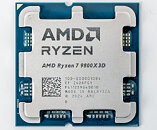
ASRock Taking AMD Motherboard and Ryzen CPU Issues Very Seriously
At Computex 2025, ASRock deliberated over the problems that have plagued certain AMD 800-series motherboard models. Fatal combinations—usually affecting popular Ryzen 7 9800X3D gaming CPUs—have been highlighted by sections of the PC hardware community, and (subsequently) press outlets. Months ago, the Taiwanese mainboard manufacturer's Japanese branch took a combative stance (in response to widespread criticism). Following continued failures of Team Red "Granite Ridge" desktop processors on "mid-to-high-end" ASRock mainboards—even in non-3D V-Cache guises—company representatives have interacted with key media conduits, including Tech YES City's Bryan Bilowol. Coinciding with the release of fresh BIOS fixes, long-form video coverage of Q&A sessions have turned up on YouTube.
Company reps have alluded to a warranty replacement scheme, but full details were not disclosed during May-time Computex proceedings. Many critics are still waiting for an official company statement; hopefully addressed to a global audience. In the meantime, one regional office has weighed in with some much-needed outreach: "ASRock Korea takes the recent AMD 800 series motherboard issues experienced by some users very seriously and will follow up with you to protect your trust. ASRock is continuously monitoring the performance and stability of the platform and will provide a firmware update as soon as possible if any issues are identified. In addition, if the system you are using is damaged due to this issue, we will take responsible measures for both the CPU and the motherboard distributed through the official domestic importer, and please submit the case through ASRock Korea's official distributor for diagnosis and processing. ASRock Korea will continue to listen to the voices of our customers and do our best to remain a trusted brand." This message was posted on Quasar Zone; a high-traffic PC hardware forum. A good number of manufacturers have responded to cases raised by members of this South Korean community.
Company reps have alluded to a warranty replacement scheme, but full details were not disclosed during May-time Computex proceedings. Many critics are still waiting for an official company statement; hopefully addressed to a global audience. In the meantime, one regional office has weighed in with some much-needed outreach: "ASRock Korea takes the recent AMD 800 series motherboard issues experienced by some users very seriously and will follow up with you to protect your trust. ASRock is continuously monitoring the performance and stability of the platform and will provide a firmware update as soon as possible if any issues are identified. In addition, if the system you are using is damaged due to this issue, we will take responsible measures for both the CPU and the motherboard distributed through the official domestic importer, and please submit the case through ASRock Korea's official distributor for diagnosis and processing. ASRock Korea will continue to listen to the voices of our customers and do our best to remain a trusted brand." This message was posted on Quasar Zone; a high-traffic PC hardware forum. A good number of manufacturers have responded to cases raised by members of this South Korean community.
































































